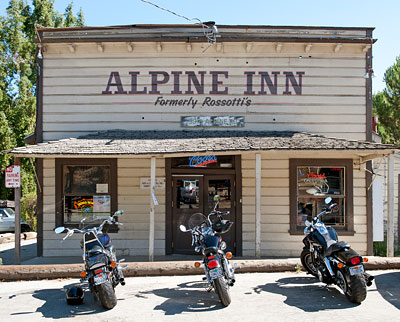National Register of Historic Places in San Mateo County
Casa de Tableta
AKA Alpine Inn
3915 Alpine Road
Portola Valley
Built c.1851
During its first fifty years, the façade of this saloon was very similar to the way it appears today. It often served as a place to display political posters, circus advertisements, etc. The redwood exterior was given no attention with paint. To secure a new leasee in 1904, the owner painted the building a, pristine white and raised the false front as it appears today.
During its heyday before Prohibition a large, gold and black sign announced "The Wunder." During the building's lifetime numerous small lean-to, shed-like additions have appeared and disappeared on both sides. In the 1930s the addition of restrooms created a permanent appendage across the rear.
Originally the interior was divided into five small rooms. Around 1970, all partitions were removed to create one large room. The old bar, which had stood opposite the swinging doors in the narrow bar room, was pushed back along a side wall.
A significant fact is that the structure looks much the same after nearly one hundred and twenty-five years of mistreatment by patrons, leasees and owners.
Excerpted from the NRHP nomination.

- Casa de Tableta served as a rendezvous for the Spanish-speaking Californios in the 1850s and 1860s when they were being harrassed by the invading populace.
- It was located strategically at the junction of an Indian trail used by Californios and Americans to cross the San Francisco Peninsula, and of an old cattle and logging road, Arrastrado, to San Jose.
- It has been used for dispensing liquor throughout all the American Period in California history.
After the American-Mexican War many Californios were pushed from their homes by the Gold Rush emigrants. At this time Maximo Martlnez, the grantee of Rancho del Gorte de Madera, gave a friend, Felix Buelna, ninety-five acres of land. The nearby city, San Jose, passed an ordinance prohibiting Sunday gambling and all Sabbath desecrating amusements. Buelna undertook the philanthropic enterprise of providing a roadhouse on this property. There his displaced friends met to play Monte. In 1867 Buelna leased el casa de tableta to a Mexican, Jesus Ramos, and a German-Italian, Fernando Valencia. The following year Buelna lost all of his property in a poker game for "forty and eight pesos" to William Eccles Stanton, an Irish teamster.
Leasing the gambling house to Englishman, William Tate Philpott, disrupted the haven for Californios. After 1875 Stanton hired an emigrant from the Azores, Rodriquez Crovello, as barkeeper, and the saloon acquired his nickname, "Chapete's." Nearby construction caused business to flourish, and the new Stanford University provided a different patronage - students. University dignitaries were reminded by the County Board of Supervisors to "missionize at home before crossing the creek" (the county boundary). Saloons were eradicated in all surrounding towns, but this rural spot was invincible. Even a dry zone around the U.S. Army Camp Fremont did not include this saloon.
Its sign, "The Wunder," emphasized the international flavor and invulnerability of the structure. With Prohibition this sign was blackened, and the place was referred to as a picnic park. Nevertheless, the purpose remained unchanged. The doors never ceased swinging.
Excerpted from the NRHP nomination.

